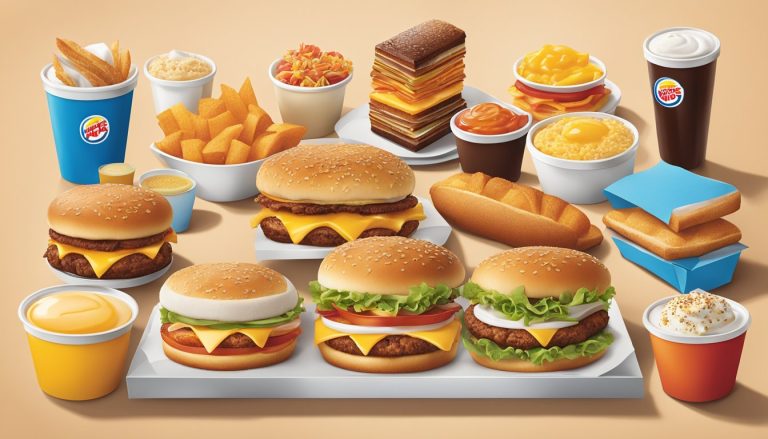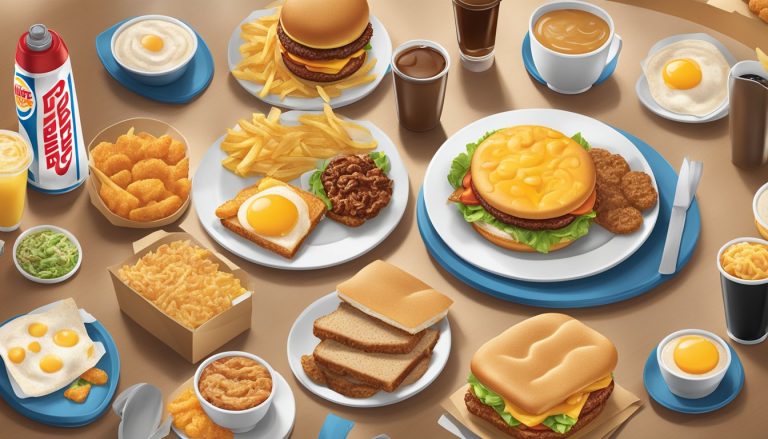Burger King has been a major player in the fast-food industry since its founding in 1953. The company’s marketing strategies have evolved significantly over the years, particularly in the breakfast segment. Burger King’s breakfast marketing approaches have ranged from menu innovation and limited-time offers to targeted advertising campaigns and digital promotions.
As consumer preferences and technology have changed, so too has Burger King’s approach to promoting its breakfast offerings. The fast-food giant has consistently aimed to differentiate itself from competitors by emphasizing unique menu items and creative marketing tactics. These efforts have helped Burger King maintain its position as a popular choice for morning meals among fast-food enthusiasts.
Burger King’s breakfast marketing strategies have adapted to changing market conditions and consumer trends. The company has leveraged social media, mobile apps, and personalized promotions to reach customers in new ways. By analyzing these strategies, one can gain insight into the broader shifts in fast-food marketing and consumer behavior over the past several decades.
Historical Overview of Burger King’s Breakfast Offerings
Burger King’s journey into the breakfast market began in the 1970s as fast food chains recognized the potential of morning meals. The company’s breakfast offerings have since evolved significantly, adapting to changing consumer tastes and market trends.
Introduction of the Breakfast Menu
Burger King launched its first breakfast menu in 1979, entering the morning meal arena after competitors like McDonald’s. The initial offerings included simple items such as French toast sticks, breakfast sandwiches, and hash browns. These products aimed to provide quick, convenient options for customers on the go.
The company’s signature breakfast sandwich, the Croissan’wich, debuted in 1983. This innovative product combined a croissant with traditional breakfast ingredients, setting Burger King apart in the competitive breakfast market.
Evolution and Expansion
As consumer preferences shifted, Burger King continuously updated its breakfast lineup. In the 1990s and 2000s, the chain introduced healthier options like oatmeal and fruit smoothies to cater to health-conscious customers.
Burger King expanded its breakfast hours in 2014, serving morning meals until 10:30 AM to compete with other fast food giants. In recent years, the company has focused on product innovation, introducing items like breakfast burritos and pancake platters.
Internationally, Burger King adapted its breakfast menu to suit local tastes. For example, in the UK, the chain offers a full English breakfast, while in Mexico, customers can enjoy breakfast tacos.
Foundational Marketing Strategies
Burger King’s breakfast marketing strategies rest on a foundation of strong brand positioning, targeted segmentation, and a carefully crafted marketing mix. These core elements have shaped the fast food giant’s approach to capturing the competitive morning meal market.
Brand Positioning and Identity
Burger King positions its breakfast offerings as a hearty, satisfying alternative to competitors. The brand emphasizes flame-grilled quality and customization, extending its “Have It Your Way” slogan to morning menu items. This differentiation strategy sets Burger King apart in the crowded breakfast space.
Key elements of Burger King’s breakfast brand identity include:
- Focus on flame-grilled taste
- Generous portion sizes
- Customizable options
- Value-driven promotions
The company leverages its iconic crown logo and color scheme to maintain brand consistency across all dayparts, including breakfast.
Segmentation and Targeting
Burger King segments its breakfast audience primarily by lifestyle and demographic factors. Target segments include:
- Time-pressed commuters
- Value-conscious consumers
- Young adults and college students
- Families with children
Marketing efforts often highlight convenience and affordability to appeal to these groups. Burger King tailors its breakfast menu and promotions to meet the specific needs of each segment.
Marketing Mix Application
Burger King’s breakfast marketing mix encompasses:
Product: A diverse menu featuring both indulgent and healthier options. Signature items like the Croissan’wich and breakfast burritos cater to different taste preferences.
Price: Competitive pricing and value meals attract cost-conscious consumers. Limited-time offers and combo deals drive traffic during breakfast hours.
Place: Widespread availability through drive-thru, in-store, and delivery options. Extended breakfast hours in many locations increase accessibility.
Promotion: Multi-channel advertising campaigns, including TV commercials, social media engagement, and mobile app promotions. Loyalty programs incentivize repeat visits during breakfast time.
Advertising Campaigns
Burger King’s breakfast marketing has relied on eye-catching and sometimes controversial advertising campaigns. These efforts have aimed to differentiate the brand and drive awareness of its morning menu offerings.
Milestone Campaigns Timeline
1983 – Burger King launches its breakfast menu nationwide with the slogan “America’s Wake-Up Call.”
1994 – The “Get Your Burger’s Worth” campaign promotes value-priced breakfast items.
2006 – “Wake Up with the King” campaign debuts, featuring the Burger King mascot in bed with customers.
2014 – “Burgers at Breakfast” promotion introduces Whoppers and other sandwiches to the morning menu.
2019 – “King of the Morning” campaign highlights freshly-cracked eggs on breakfast sandwiches.
2022 – “Escape the Usual” push encourages customers to break out of boring breakfast routines.
Impact of the Moldy Whopper Campaign
The 2020 Moldy Whopper campaign, while not breakfast-specific, significantly impacted Burger King’s overall brand perception. This bold ad showed a Whopper decomposing over 34 days to highlight the removal of artificial preservatives.
Key impacts:
- Generated over 8.4 billion media impressions
- Increased brand consideration by 22.8%
- Boosted purchase intent by 36%
While risky, the campaign’s success demonstrated consumer interest in natural ingredients, influencing future breakfast marketing strategies.
Provocative and Bold Advertising
Burger King’s breakfast ads often employ provocative tactics to stand out in the crowded fast-food landscape. Notable examples include:
- 2018’s “Pancake Sandwich” campaign, featuring a giant stack of pancakes crushing cars
- 2021’s “Confusing Times” ads promoting plant-based breakfast options with surreal imagery
- 2023’s “Royal Wake-Up Call” promotion, where customers could win breakfast delivery from costumed kings
These campaigns aim to generate buzz and social media engagement. While sometimes polarizing, they have helped Burger King maintain visibility in the competitive breakfast market.
Digital Marketing Evolution
Burger King’s digital marketing strategies have transformed dramatically over the years. The fast food giant embraced new technologies and platforms to connect with customers in innovative ways.
Shift to Digital and Social Media
Burger King recognized the power of digital channels early on. They established a strong presence on major social media platforms like Facebook, Twitter, and Instagram. These platforms allowed for direct engagement with customers and rapid dissemination of promotions.
Burger King’s social media approach blends humor, trendy content, and promotional offers. Their witty tweets and Instagram posts often go viral, increasing brand visibility. They’ve also leveraged user-generated content, encouraging customers to share their Burger King experiences online.
The company uses targeted digital ads to reach specific demographics. This precision targeting allows for more efficient marketing spend and higher conversion rates compared to traditional advertising methods.
Innovative Campaigns like Whopper Detour
Burger King’s “Whopper Detour” campaign in 2018 exemplified their digital innovation. The promotion offered customers a Whopper for just one cent if ordered through the Burger King app while within 600 feet of a McDonald’s location.
This campaign showcased:
- Creative use of geolocation technology
- Seamless integration of mobile app and in-store experiences
- Clever competitive strategy against their main rival
The Whopper Detour drove significant app downloads and increased mobile orders. It also generated substantial buzz on social media and in the press, amplifying its impact.
Leveraging Mobile Ordering and Delivery
Burger King has heavily invested in mobile ordering capabilities. Their app allows customers to:
- Browse menus
- Customize orders
- Pay securely
- Earn rewards points
The company has also partnered with multiple delivery services like Uber Eats and DoorDash. This strategy expands their reach beyond traditional drive-thru and dine-in customers.
Burger King uses push notifications and in-app promotions to drive repeat purchases. They analyze user data to personalize offers and improve the mobile experience.
These digital initiatives have helped Burger King stay competitive in an increasingly tech-driven fast food landscape.
Collaborations and Partnerships
Burger King has leveraged strategic collaborations and partnerships to enhance its breakfast marketing efforts. These initiatives have expanded the brand’s reach and created unique experiences for customers.
Co-Branding Initiatives
Burger King has partnered with popular food brands to create innovative breakfast offerings. In 2019, the chain collaborated with Kellogg’s to introduce the Froot Loops Shake, blending cereal flavors into a morning drink.
The company also teamed up with Kraft Heinz to develop the Grilled Cheese Breakfast Sandwich, combining familiar comfort foods. These co-branded products generated buzz and attracted new customers to Burger King’s breakfast menu.
Partnerships with coffee brands like Seattle’s Best Coffee improved Burger King’s morning beverage options, directly competing with other fast-food chains’ breakfast offerings.
Tie-Ins with Entertainment and Sports
Burger King has integrated pop culture into its breakfast marketing through strategic partnerships. The chain collaborated with Netflix to promote the show “Stranger Things,” offering an “Upside Down Whopper” that tied into the show’s theme.
In sports, Burger King sponsored Stevenage FC, a lower-league English football team. This partnership led to a viral marketing campaign where fans could complete challenges in the FIFA video game while playing as Stevenage, earning real-world food rewards.
These entertainment and sports tie-ins helped Burger King create memorable breakfast promotions and engage with younger audiences.
Local and Global Market Adaptation
Burger King has tailored its breakfast offerings to meet diverse consumer preferences across different regions. The company balances localization strategies with global brand consistency to appeal to varied markets worldwide.
Localization Strategies
Burger King adapts its breakfast menu to cater to local tastes and cultural preferences. In Japan, the chain offers teriyaki burgers for breakfast. Indian outlets feature vegetarian options like the Veg Burger with Egg.
In the UK, Burger King introduced a Full English Breakfast sandwich. This localization extends beyond food items. The company adjusts marketing campaigns to resonate with local consumers. For instance, in Spain, advertisements emphasize late-night breakfast options to align with local eating habits.
Global Presence and Adaptation
Burger King maintains a consistent brand image while adapting to global markets. The company’s core breakfast offerings, like the Croissan’wich, are available in many countries. However, portion sizes and ingredients may vary to suit regional preferences.
In Muslim-majority countries, Burger King ensures halal-certified ingredients. The chain also adjusts operating hours to accommodate different breakfast times globally. In some European countries, breakfast is served until late morning, while in the US, it often ends earlier.
Burger King’s global strategy involves market segmentation based on demographic and cultural factors. This approach allows the company to target specific consumer groups effectively in each market, optimizing its breakfast menu and marketing efforts accordingly.
Commitment to Quality and Innovation
Burger King has consistently demonstrated its dedication to providing high-quality food and innovative menu options. The fast-food giant focuses on using fresh ingredients and developing new products to meet changing consumer preferences.
Maintaining Food Quality and Fresh Ingredients
Burger King prioritizes the use of fresh, natural ingredients in its menu items. The company sources high-quality beef for its signature Whopper burgers, ensuring a consistent taste and texture. Buns are baked fresh daily in many locations, contributing to the overall quality of their sandwiches. Burger King also emphasizes food safety practices, implementing strict standards for ingredient storage and preparation. To maintain freshness, the company utilizes a made-to-order system, assembling burgers only after customers place their orders. This approach helps preserve the quality and taste of their products.
Introducing Plant-Based Options
In response to growing consumer demand for meat alternatives, Burger King launched the Impossible Whopper in 2019. This plant-based burger patty, developed in partnership with Impossible Foods, closely mimics the taste and texture of beef. The introduction of the Impossible Whopper marked a significant step in Burger King’s product innovation strategy. The company has since expanded its plant-based offerings in various markets worldwide, catering to vegetarian and flexitarian customers. These new menu items demonstrate Burger King’s commitment to adapting to changing dietary preferences while maintaining its signature flavors.
Customer-Driven Approaches
Burger King’s breakfast marketing strategies focus heavily on customer-centric initiatives. These approaches aim to enhance brand loyalty and create meaningful connections with customers.
Engaging Customer Experience
Burger King prioritizes creating memorable experiences for breakfast patrons. The brand redesigned its restaurant interiors to provide a more welcoming atmosphere during morning hours. Digital menu boards offer customization options, allowing customers to tailor their breakfast orders.
Mobile ordering and curbside pickup were introduced to streamline the breakfast rush. These conveniences cater to time-pressed morning customers. Burger King also implemented a “Have It Your Way” philosophy for its breakfast menu, encouraging personalization.
The chain regularly conducts customer surveys to gather feedback on breakfast offerings. This data drives menu innovations and improvements in service quality.
Loyalty Programs and Rewards
Burger King’s Royal Perks program incentivizes breakfast purchases. Members earn points on every order, which can be redeemed for free menu items. The program offers exclusive breakfast deals and early access to new menu items.
A tiered system rewards frequent breakfast visitors with additional perks. These include free upgrades and birthday rewards. The loyalty app sends personalized offers based on customer preferences and ordering history.
Burger King leverages user-generated content to promote its breakfast menu. Customers are encouraged to share photos of their morning meals on social media. The brand often features these posts, fostering a sense of community among breakfast enthusiasts.
Sustainability and Responsibility

Burger King has embraced sustainability and social responsibility as key pillars of its brand strategy. The company has implemented various initiatives to reduce its environmental impact and contribute positively to society.
Environmental Initiatives
Burger King has taken steps to minimize its ecological footprint. The company has committed to eliminating artificial colors, flavors, and preservatives from its menu items. This move aims to provide healthier options and reduce the use of synthetic ingredients.
In 2020, Burger King launched a campaign featuring the “Reduced Methane Whopper.” This initiative highlighted the use of lemongrass in cattle feed to reduce methane emissions from cows. While the scientific effectiveness was debated, it demonstrated Burger King’s attention to environmental concerns.
The fast-food giant has also pledged to source 100% of its palm oil from sustainable sources. This commitment helps combat deforestation and protects biodiversity in palm oil-producing regions.
Corporate Social Responsibility
Burger King has engaged in various social responsibility programs. The company launched the “Burger King McLamore Foundation” to support employee education through scholarships and grants. This initiative helps staff members pursue higher education and develop their careers.
The brand has also partnered with organizations like No Kid Hungry to combat childhood hunger. Through in-restaurant fundraising campaigns, Burger King has contributed to providing meals to children in need.
In response to the COVID-19 pandemic, Burger King offered free kids meals to families struggling during school closures. This gesture demonstrated the company’s commitment to supporting communities during challenging times.
Burger King has also focused on diversity and inclusion within its workforce and leadership. The company has implemented programs to promote equal opportunities and representation across all levels of the organization.
The Role of Franchising
Franchising has been central to Burger King’s growth and breakfast marketing strategies. It has allowed the company to expand rapidly while maintaining consistency across locations.
Franchise Model Impact
Burger King’s franchise model has significantly influenced its breakfast marketing efforts. The company provides franchisees with standardized menus, advertising materials, and operational guidelines. This ensures a uniform breakfast experience across different locations.
Franchisees contribute local market insights, helping Burger King tailor breakfast offerings to regional preferences. This localized approach has been crucial in competing with other fast-food chains.
The Pillsbury Company’s acquisition of Burger King in 1967 accelerated franchise growth. This partnership brought additional resources and expertise, enabling faster expansion of breakfast menu items.
Franchising has facilitated Burger King’s global expansion, introducing breakfast options to new markets. Local franchisees adapt breakfast menus to suit cultural tastes while maintaining core brand elements.
The franchise model allows for quicker implementation of new breakfast marketing initiatives. Franchisees can rapidly deploy promotions and menu updates, keeping breakfast offerings fresh and competitive.




